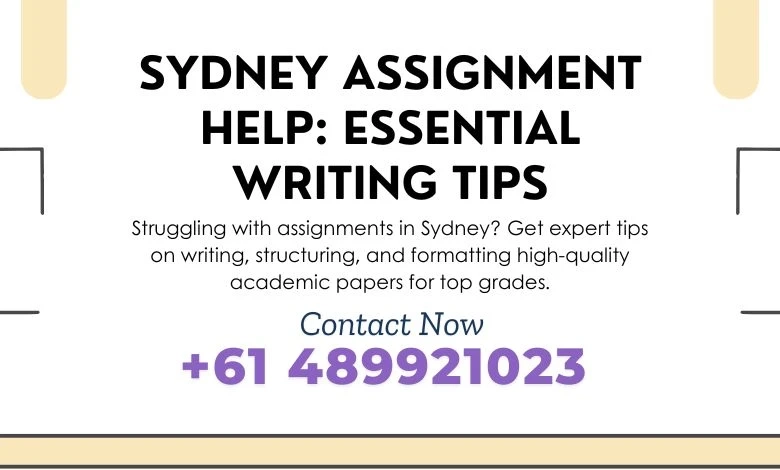Struggling with assignments in Sydney? You are not alone. University and college students often face challenges in writing academic papers due to a lack of time, complex syllabi, and strict formatting guidelines. With the help of assignments, your grades and writing skills can improve significantly.
In this blog, our essential writing tips have helped Raura to create high-quality academic assignments and also highlighted the benefits of professional writing services.
Understand the need for the assignment.
One of the most crucial steps in assignment writing is understanding the given instructions. Before starting your work:
- Read the prompt carefully to determine the type of assignment (essay, report, case study, etc.).
- Identify key requirements such as word count, referencing style, and submission deadlines.
- Clarify doubts with your professor or seek online assignment help if necessary.
Researching Effectively
Thorough research is the backbone of a well-structured academic paper. Here’s how you can conduct effective research:
- Use credible sources such as academic journals, books, and government websites.
- Avoid relying on Wikipedia or non-academic blogs for factual information.
- Take organized notes and categorize information based on relevance.
- Keep track of sources for proper citation and reference list creation.
Structuring Your Assignment
A well-organized structure ensures clarity and coherence in your writing. Most academic papers follow this basic structure:
1. Introduction
- Introduce the topic and provide background information.
- Clearly state the purpose of your assignment.
- Include a strong thesis statement outlining the main argument or objectives.
2. Body Paragraphs
- Divide content into sections with appropriate headings.
- Each paragraph should have a clear topic sentence followed by evidence and analysis.
- Support arguments with citations from credible sources.
- Ensure logical flow between paragraphs for smooth readability.
3. Conclusion
- Summarize key points discussed in the assignment.
- In light of the reasons put forth, restate the thesis.
- Provide recommendations or final thoughts, if applicable.
Formatting and Referencing
Proper formatting and referencing are crucial for maintaining academic integrity. To ensure your assignment meets university standards:
- Follow the prescribed guidelines for font size, spacing, and margins.
- Use the required referencing style, such as APA, Harvard, or MLA.
- Include accurate in-text citations and compile a comprehensive reference list.
- Leverage citation management tools like EndNote, Zotero, or Mendeley to streamline referencing and avoid errors.
Following formatting guidelines will enhance readability and demonstrate professionalism in academic writing. Accurate references ensure that all sources used are acknowledged and help prevent plagiarism, a serious academic offense. False citations or missing references can result in penalties, so always double-check your work before submitting it.
If you are unsure about your formatting or referencing requirements, consult your university guidelines or seek professional assignment help. Having expert help can help ensure that your citations are formatted correctly and that your assignments meet academic standards.
Proofreading and Editing
Effective proofreading and editing play a vital role in refining your assignment and ensuring clarity. To improve the overall quality of your writing, follow these essential steps:
Take a Break Before Editing: After completing your initial draft, step away from your work for a while. You can return from this break with a new perspective, which makes it simpler to identify mistakes and discrepancies.
Read Aloud for Better Clarity: Reading your assignment aloud can help you identify awkward phrasing, grammatical mistakes, and unclear sentences. It forces you to process your writing more thoroughly and detect issues that may be overlooked during silent reading.
Utilize Grammar-Checking Tools: Online tools such as Grammarly, Hemingway Editor, and Microsoft Word’s built-in grammar checker can assist in spotting typos, grammatical mistakes, and readability issues. However, always review suggestions carefully, as automated tools may not catch context-specific errors.
Check for Consistency in Formatting and Style: Ensure that your assignment adheres to your university’s formatting guidelines, including font style, spacing, and reference formatting. Double-check citation styles such as APA, Harvard, or MLA to avoid inconsistencies.
Seek Feedback from Others: Ask a classmate, friend, or professional editor to review your assignment. An external perspective can provide valuable insights, helping you identify unclear arguments, logical gaps, or redundant content.
Focus on Sentence Structure and Clarity: Ensure your sentences are concise and clear. Steer clear of extremely intricate phrase constructions that could perplex the reader. Aim for a logical flow of ideas throughout your assignment.
Verify Citations and References: Proper referencing is essential for maintaining academic integrity. Cross-check all in-text citations with your reference list to ensure accuracy and completeness.
Conduct a Final Review: Before submitting your assignment, give it one last thorough read. Pay attention to details such as punctuation, spelling, and coherence. A polished and error-free assignment demonstrates professionalism and enhances your credibility as a student.
Benefits of Professional Assignment Help Services
Sometimes, even with the best efforts, students may struggle to complete their assignments on time. Here’s how professional assignment help services can be beneficial:
- Expert Assistance: Qualified writers with subject-specific expertise.
- Plagiarism-Free Content: Original work with proper citations.
- Timely Delivery: Ensures submissions before deadlines.
- Customized Solutions: Tailored content based on assignment requirements.
- 24/7 Support: Assistance whenever you need it.
Conclusion
Following a prototype plan, research, and statistics are essential for high-quality candidates. By following these essential tips, you can improve your writing skills and boost your practice performance. However, if you need extra help, professional support services in Sydney are available to provide expert guidance.
If you are struggling with complex topics or tight deadlines, seeking assistance can help you get better grades while reducing stress. Start applying these templates today and take your lyrical writing to the next level!
Frequently Asked Questions (FAQs)
How should an assignment be started?
Start by carefully reading the assignment prompt, understanding the requirements, and conducting thorough research. Create an outline before writing to ensure a logical flow.
How can I improve my academic writing skills?
Practice regularly, read academic papers to understand formal writing styles, and seek feedback from professors or peers. It can also be beneficial to use online resources like Grammarly.
What are common mistakes students make in assignments?
Common mistakes include poor structuring, lack of proper referencing, weak arguments, grammatical errors, and failure to follow the assignment prompt.
How do I ensure my assignment is plagiarism-free?
Use proper citations and references for all sources. Run your work through plagiarism detection tools like Turnitin to check for unintentional similarities.


